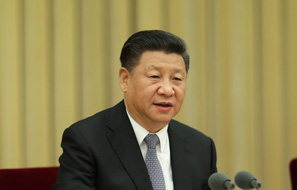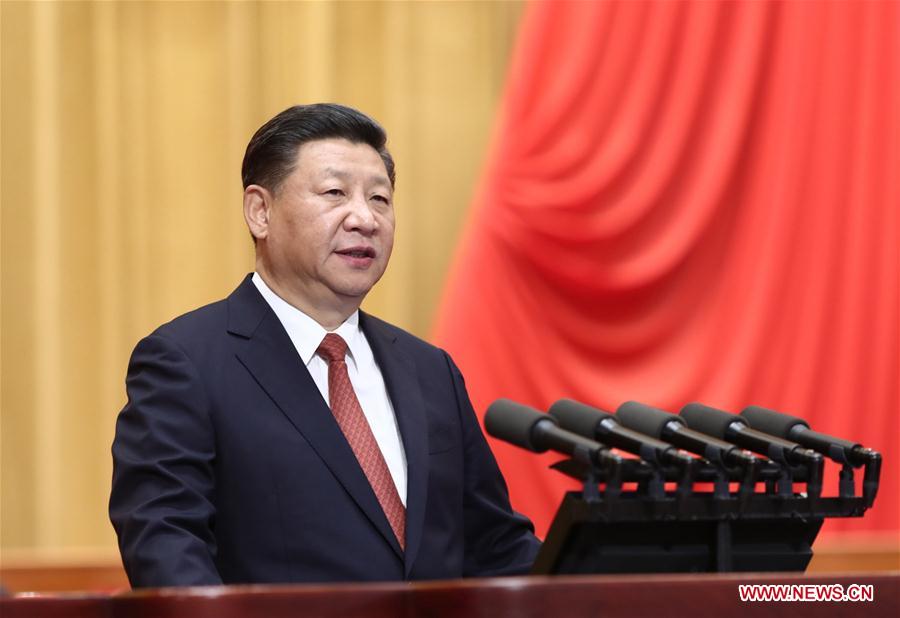China Focus: Decoding DNA of the CPC
by Xinhua writers Wang Jianhua, Tan Yixiao and Zhang Bowen
The Communist Party of China (CPC) is ready to hold its 19th National Congress this month, when new guidelines will be issued to further develop socialism with Chinese characteristics.
Since its founding in 1921, the CPC has overcome great hardships. However, by remembering its roots and progressing with innovation, the Party has established China firmly on the world stage.
FAITH IN MARXISM
Political parties the world over have recognized the need for faithfulness to their spiritual foundations. The CPC is no different.
Ever since the Party's founding, Marxism has been its creed, communism its supreme ideal. Marxism, in particular, is the foundation of theories developed by Chinese communists to guide the cause of the CPC and the nation.
"Communists' faith in Marxism, socialism and communism is their political soul and sustains them in all tests," read the report of the CPC's 18th National Congress in 2012.
At the rally marking the 95th anniversary of the CPC in 2016, Xi Jinping, general secretary of the CPC Central Committee, warned against "deviating from or abandoning Marxism," as without such a fundamental guiding theory the Party would "lose its soul and direction."
It is no surprise then, that a first edition Chinese translation of The Communist Manifesto, which is now exhibited at the 1st CPC National Congress Memorial, has been carefully preserved through times of war and revolution.
"The reason why the CPC could lead the nation and the people to historic achievements is that the Party has always been true to its founding mission," said Zhang Liming, head of the memorial.
"The CPC and socialism are becoming more dynamic, which is a result of Marxism's successful practice in China," said Huang Renwei, researcher with the Shanghai Academy of Social Sciences.
PEOPLE-ORIENTED DEVELOPMENT
At the China Executive Leadership Academy of Jinggangshan, students get a chance to live in some of the villages that have been lifted out of poverty to experience the firsthand effects of poverty relief in an experiential course.
"The course aims to bring CPC officials closer to the people," said Mei Liming, executive vice president of the academy.
As the heartland of the early revolutionary activities of the CPC in east China's Jiangxi Province, it is symbolic that Jinggangshan has been officially taken off the list of impoverished areas.
The CPC comes from the people, therefore the people are seen as a source of strength and wisdom.
"To meet the people's desire for a happy life is our mission," said Xi Jinping when meeting the press after being elected as general secretary of the CPC Central Committee in 2012.
Xi has repeatedly stressed that the success of the Party hinges on the support of the people.
The CPC and the Chinese government have been taking heed of the people's needs and formulating policies accordingly, which in turn helps promote social stability.
More than 700 million people have been lifted out of poverty since China's reform and opening-up policy was adopted in 1978. Currently, the goal is to eradicate poverty in the country by 2020.
Foreign analysts have pointed out that social problems can derive from a young population's diverse demands and their discontent. Therefore China is pushing innovation and entrepreneurship in order to boost employment, invigorate the economy and ensure social stability.
"The CPC and socialism have maintained their vitality mainly because seeking benefit for the people is at the center of the Party's values and cause," said Professor Dai Yanjun with the CPC Central Committee Party School.
CONTINUED REFORM AND INNOVATION
The reform and opening-up policy has ushered in an era of innovations in ideas, systems and policies in the country.
"The socialist path, theory, system and culture with Chinese characteristics are evidence of the CPC's creativity," said Professor Huang Xianghuai with the CPC Central Committee Party School.
Since its 18th National Congress, the CPC has championed a new concept of innovation, coordination, green development, opening up and sharing, as well as supply-side structural reform to cope with the economic "new normal."
Led by Xi, the Central Leading Group for Deepening Overall Reform has held 38 meetings since its establishment. More than 1,000 reform measures are being carried out and supervised nationwide.
"The CPC will never lose its vitality as long as it continues to reform and innovate," said Huang.
STRICT PARTY GOVERNANCE
"To forge iron, one must be strong oneself." This is the lesson the CPC has taken away from the drastic changes in the former Soviet Union and eastern Europe.
The Party proposed the policy of self-discipline in 1962, and "strict governance" in 1985. In 2014, Xi put forward that comprehensively and strictly governing the Party was a necessity.
The CPC constitution is the basis for intra-Party supervision, and several amendments have been made to ensure that self-discipline and strict governance continue.
In the meantime, regulations and rules were also improved.
For example, the CPC introduced the norms of political life within the Party under the current conditions in November 2016, and amended a regulation on intra-Party supervision.
Since the 18th CPC National Congress, the Political Bureau of the CPC Central Committee has set an example in the Party by implementing the eight-point frugality code.
The strict governance and intra-Party democracy have helped the CPC maintain vitality.
SELECTING THE CAPABLE
The CPC has always regarded selecting and employing the right and capable persons as a key issue in its cause.
Since the 18th CPC National Congress, the Party has deepened reforms on how officials are appointed, making sure that the selection is based on a wider criteria than just an official's votes, scores, age or GDP achievements in his or her region.
Xi said that it is important to recruit Party members from diverse backgrounds in order to better fulfill the Party's tasks.
Xi knows the importance of such diversity, as he has been promoted through the Party from an official in a village of a poverty-stricken area to the general secretary of the CPC Central Committee.
INTERNATIONAL DEVELOPMENT
In January 2017, Xi proposed building "a community of shared future for mankind" in Geneva. One month later, the concept, together with China's Belt and Road Initiative, was incorporated into a UN resolution.
With China's involvement, international governance mechanisms like the SCO (Shanghai Cooperation Organization), the BRICS summit, APEC (Asia-Pacific Economic Cooperation) as well as the G20 summit have become increasingly effective. China's contributions to international governance have won international recognition.
In the 21st century, especially since the financial crisis, some western countries have seen the rise of populism and idealization of isolation from the global stage.
The ruling CPC, however, has sought to engage with rather than withdraw from this world of economic globalization and interconnection. It has been able to simultaneously practice good governance domestically and work towards solutions for international issues.
The CPC, with the socialism with Chinese characteristics it leads, has broadened the space for the modernization of developing countries, and brought Chinese wisdom and Chinese solutions to worldwide problems.
(Xu Xiaoqing and Zhang Zhanpeng also contributed to the story)
Your Comment
Name E-mailRelated News
-
;
-
-

-
Xi urges solid efforts to win battle against poverty
Xi, also general secretary of the Communist Party of China (CPC) Central Committee, gave the instruction ahead of the fourth National Poverty Relief Day, which falls on Oct. 17.
-
-
-

-
China Focus: Xi's inspection tours across China as top Party leade
Since the 18th Communist Party of China (CPC) National Congress in 2012, Xi Jinping, general secretary of the CPC Central Committee, has been all over the country on inspection tours.
-
Based in Lhasa, Tibet Vista is a Tibet travel agency that specialized in Tibet permit, and Tibet tours for both private and group travelers at a local price!
•4 Days Lhasa City Group Tour from USD 460 •8 Days Everest Base Camp Group Tour from USD 850 •15 Days Mt.Kailash Group Tour from USD 1780 •2016 Tibet Train Tours from Beijing, Shanghai, Chengdu, Xining,etc










